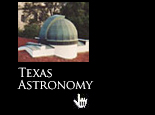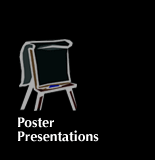Sunday, October 16th
|
7:00pm:
|
Reception (Appetizers and Drinks)
Mansion at Judges Hill
(website)
Map & Parking
(pdf)
1900 Rio Grande Blvd., (512) 495-1800
|
Monday, October 17th
|
8:45:
|
Welcoming Statements
Mary Ann Rankin, Dean, College of Natural Sciences
Don Winget, Chair, Department of Astronomy
|
|
Session I, ACES 2.302 - Judit Györgyey Ries, Chair,
bio
|
9:00-9:40:
|
Asteroids, Kuiper Belt Objects, Comets, Satellites and the Formation of Our Solar System
Scott Sheppard, Carnegie DTM
abstract
bio
|
9:40-10:20:
|
What do Multiple Planet Systems Teach Us About Planet Formation?
Eric Ford, Berkeley
abstract
bio
|
10:20-11:00:
|
Coffee & Posters, ACES 2.402
|
11:00-11:40:
|
Massive Star Formation: A Tale of Two Theories
Mark Krumholz, Princeton
abstract
bio
|
11:40-12:20:
|
Probing Chemistry During Star and Planet Formation
Jackie Kessler-Silacci, UT
abstract
bio
|
12:20-2:00:
|
Lunch* & Posters
*includes a 1 hour Q&A session
with
postdoc speakers and graduate students
|
|
Session II, ACES 2.302 - Michael Siegel, Chair,
bio
|
2:00-2:40:
|
Disks Around Young Stars
Christine Chen, NOAO
abstract
bio
|
2:40-3:20:
|
Local Interstellar Medium
Seth Redfield, UT
abstract
bio
|
3:20-4:00:
|
Coffee & Posters, ACES 2.402
|
4:00-4:40:
|
Large-scale Structures in the ISM
Naomi McClure-Griffiths, ATNF
abstract
bio
|
4:40-5:40:
|
Panel Discussion
|
5:40-6:30:
|
Posters, Informal Discussion
|
7:30pm:
|
Conference Dinner at Fonda San Miguel
Map & Parking
(pdf)
2330 W. North Loop, (512) 459-4121
|
Tuesday, October 18th
|
|
Session III, ACES 2.302 - Martin Landriau, Chair,
bio
|
9:00-9:40:
|
Stellar Abundances: Recent and Foreseeable Trends
Carlos Allende-Prieto, UT
abstract
bio
The determination of chemical abundances from stellar spectra is
considered a mature field of astrophysics. Digital spectra of stars
are recorded and processed with standard techniques, much like
samples in the biological sciences. Nevertheless, uncertainties
typically exceed 20%, and are dominated by systematic errors. The
first part of this talk will address what is being done to reduce
measurement errors; and what is not being done, but should. The
second part will review some of the new and most exciting
applications of stellar spectroscopy in the arenas of galactic
structure, the origin of the chemical elements, and cosmology.
|
|
9:40-10:20:
|
Black Holes
Jon Miller, Univ. Michigan
abstract
bio
|
10:20-11:00:
|
Coffee & Posters, ACES 2.402
|
11:00-11:40:
|
Jets and Accretion in Microquasars and in AGN
Sera Markoff, MIT
abstract
bio
|
11:40-12:20:
|
Galactic Chemical Evolution
Yeshe Fenner, CfA
abstract
bio
|
12:20-2:00:
|
Lunch* & Posters
*includes a 1 hour Q&A session
with
postdoc speakers and graduate students
|
|
Session IV - Niv Drory, Chair,
bio
|
2:00-2:40:
|
The N-body Approach to Disk Galaxy Evolution
Victor Debattista, Univ. Washington
abstract
bio
|
2:40-3:20:
|
Galaxy Formation
Eric Gawiser, Yale
abstract
bio
|
3:20-4:00:
|
Coffee & Posters, ACES 2.402
|
4:00-4:40:
|
Lyman-alpha Forest as a Cosmological Probe
Matteo Viel, IoA
abstract
bio
|
4:40-5:40:
|
Panel Discussion
|
5:40-6:00:
|
Concluding Remarks
David Lambert, Director, McDonald Observatory
Frank Bash, Professor, Department of Astronomy
|
6:00-6:30:
|
Posters, Informal Discussion
|
Evening:
|
Informal "Night on the Town"
|


